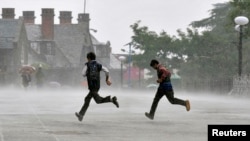In India, fears of a drought are easing as monsoon rains revive. Farmers are now urging the government to ensure that more farmland is brought under irrigation to reduce dependence on the monsoon.
Until a week ago, a 43 percent shortfall in rains had not only left India’s vast plains coping with a searing summer, but had raised worries that food output might be seriously impacted.
But in the past week, as monsoon rains lashed many parts of the country, farmers have been busy planting seeds to make up for lost time.
Charanjit Singh farms more than 40 hectares of land in the northern Punjab state, known as India’s breadbasket. Singh said his sugar cane crop is likely to suffer due to scant rains in June, but he hopes his paddy crop will not be impacted.
The shortfall of rain in June had prompted the government to gear up to distribute drought resistant seeds and fodder for animals in the worst affected regions.
India is one of the world’s largest producers of rice, corn, sugar, oilseeds and cotton. The agricultural output is not only critical to feed its 1.2 billion people - many African and Asian countries also import food items, such as rice, from India.
However, as more than half of India’s farmland is only rain fed, food production is dependent on monsoon rains, which come between June and September.
The head of the Consortium of Indian Farmers, Chengel Reddy, said that although rains have revived, the monsoon's late arrival could cut output of crops such as beans, sugar cane and oil seeds. He said this will adversely impact millions of small farmers.
“As far as cereals are concerned, India will not have a very serious problem. But in regard to the other produce, and the farmers’ employment and income, that will have serious impact on the national economy. If water comes late, the production will go down, then income will go down, therefore there will be sort of economic crisis in individual families,” said Reddy.
Farmers’ groups complain that the new Bharatiya Janata Party (BJP) government has not allocated enough resources in its recent annual budget to complete scores of irrigation projects, many of which have been stalled for years due to lack of funds.
“The BJP manifesto promised implementation and completion of irrigation projects, but the budget allocation is only Rs. 100 crores ($17 million). What do we do with 100 crores? In the last 50 days, they have been talking of roads, but nobody is thinking of irrigation, I don’t know why,” said Reddy.
Farmers groups say the government needs to do more to boost the agriculture sector, because although it only accounts for 14 percent of the gross domestic product it sustains two-thirds of the population.
The government has said that boosting the economy is its top priority, but its immediate focus has been on improving infrastructure and reviving investment.









